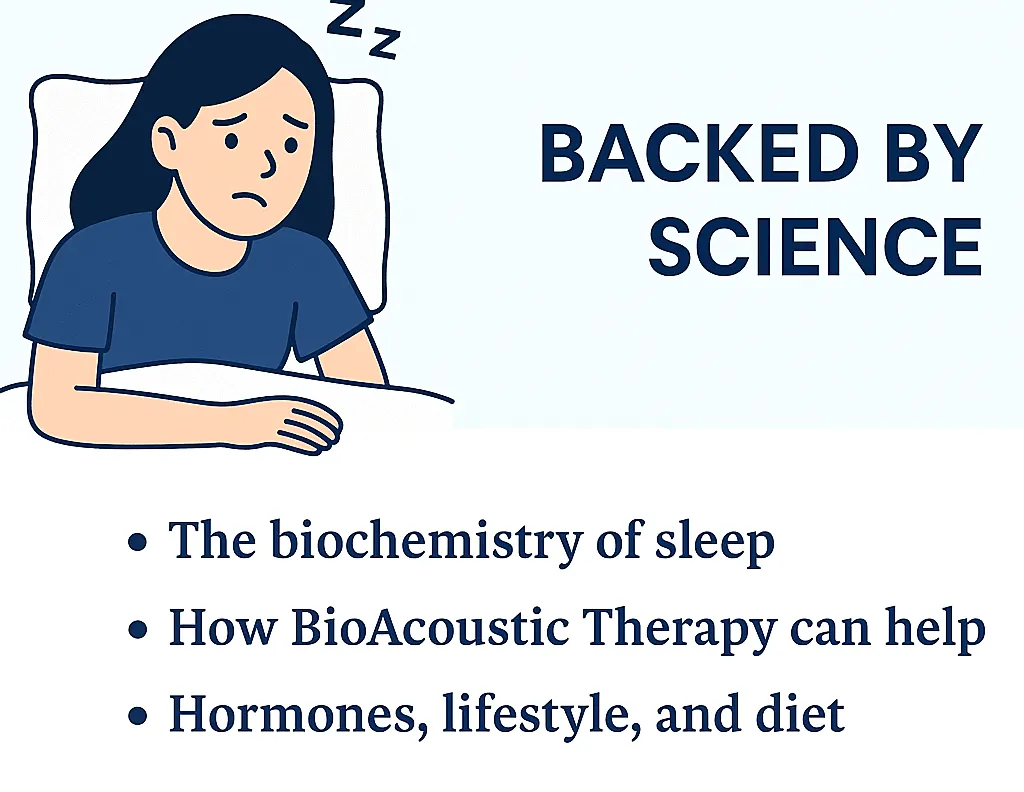Why Can’t I Sleep? A BioAcoustic Solution Backed by Science
Sleepless Nights Aren’t Just “In Your Head”
If you’re lying awake at 2:00 AM with racing thoughts, restless legs, or just plain exhaustion that refuses to give way to sleep — you’re not alone. Chronic insomnia affects 1 in 3 adults at some point in their lives, and for many, the root cause isn’t stress or too much screen time — it’s biochemical.
Sleep isn’t a passive process. It’s a carefully orchestrated hormonal and neurological symphony, influenced by what you eat, how you move, how you breathe… and even how you sound.
This is where BioAcoustic Therapy comes in — a revolutionary, non-invasive approach that uses the frequency of your voice to assess imbalances in the body and restore your sleep chemistry through sound.
The Biochemistry of Sleep: What’s Going Wrong?
1. Melatonin: The Sleep Hormone
Melatonin is released in the evening to signal that it’s time for bed. But for many people, melatonin is either not being produced enough or is being blocked by modern habits like:
-
Too much blue light after sunset (from phones, screens, LEDs)
-
Poor diet high in sugar or caffeine
-
Cortisol overload from chronic stress
What BioAcoustics Reveals: Your vocal frequencies can show melatonin deficiency — and identify underlying nutrient blocks like low tryptophan, magnesium, or B6.
2. Cortisol: The Nighttime Enemy
Cortisol, the “stress hormone,” is meant to rise in the morning and drop at night. But chronic stress, trauma, or even skipped meals can reverse that rhythm. If you’re feeling wired but tired, chances are your cortisol is peaking at night.
Signs of high nighttime cortisol:
-
Trouble falling asleep despite exhaustion
-
Waking up at 3–4 AM with a racing mind
-
Sweating or overheating at night
How BioAcoustic Therapy Helps: Sound frequency protocols can entrain your nervous system, helping cortisol calm down at night and allow melatonin to take over naturally.
3. Insulin and Blood Sugar Swings
Blood sugar regulation plays a hidden but critical role in sleep. Dips in blood glucose at night can cause adrenal surges that wake you up. This is common in people who:
-
Eat too many carbs or sugar late in the day
-
Skip meals or have irregular eating patterns
-
Have insulin resistance or prediabetes
Symptoms:
-
Falling asleep fine but waking up anxious
-
Waking up hungry or craving carbs
-
Feeling exhausted despite “enough” sleep
The BioAcoustic Approach: Frequencies tied to insulin, pancreas, and adrenal function can be evaluated and rebalanced through personalized frequency sound protocols.
⚖️ The Hormone-Sleep Connection in Women
Many women experience insomnia tied to hormonal fluctuations, especially:
-
During perimenopause (usually mid-40s)
-
With thyroid dysfunction (often undiagnosed)
-
Postpartum or after hormonal birth control use
Estrogen and progesterone shifts can make the nervous system hypersensitive, lower serotonin, and increase cortisol and histamine — a perfect storm for poor sleep.
BioAcoustic Voice Profiling can map the frequencies of hormones like:
-
Estradiol
-
Progesterone
-
TSH (thyroid-stimulating hormone)
-
Cortisol and adrenaline
With over 38 years of clinical research, BioAcoustic practitioners use this data to deliver non-invasive frequency balancing to ease hormone-related insomnia.
Sleep Starts in the Kitchen
Dietary habits are one of the most overlooked drivers of poor sleep. Here are some nutritional reasons you might not be sleeping:
| Nutrient Deficiency | Role in Sleep | Common Symptoms |
|---|---|---|
| Magnesium | Calms the nervous system | Muscle cramps, restless legs, anxiety |
| Vitamin B6 | Needed to make serotonin | Vivid dreams, low mood, irritability |
| Zinc | Regulates melatonin | Weak immune system, poor skin healing |
| Tryptophan | Converts into melatonin | Carb cravings, insomnia, poor appetite |



